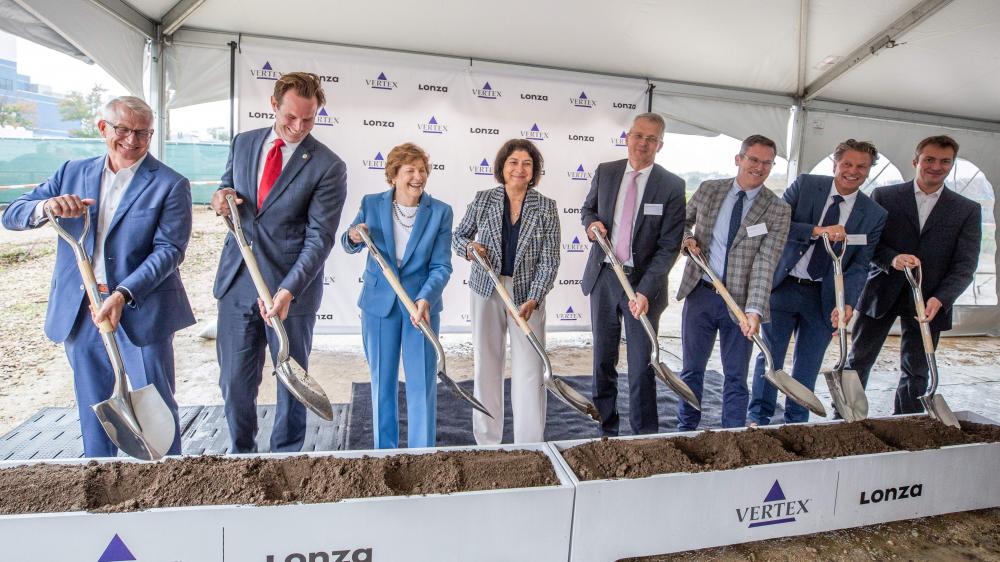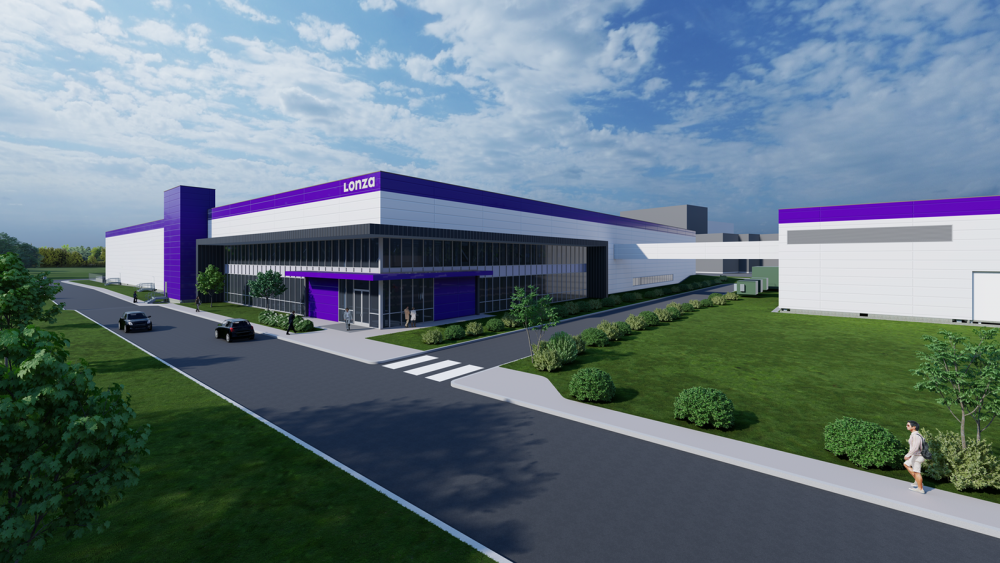
Officials and dignitaries break ground for the a drug manufacturing facility at Pease Traseport on Aug. 30. From left: Morrey Atkinson of Vertex, Portsmouth Mayor Deaglan McEachern, U.S. Sen. Jeanne Shaheen, Vertex President and CEO Reshma Kewalramani, Lonza CEO Pierre-Alain Ruffieux, Aaron Kowalski of Juvenile Diabetes Research Foundation, Daniel Palmacci of Lonza, and Alberto Santagostino of Lonza.
Two biopharmaceutical/biotech companies broke ground on Aug. 30 for a manufacturing facility in Portsmouth that could one day produce drugs that cure Type 1 diabetes.
The 130,000-square-foot facility, located at the Pease International Tradeport, is a partnership between Lonza Biologics, also located at Pease, a manufacturer of cell and gene therapies with experience supporting the commercialization of cell therapy products, and Boston-based Vertex Pharmaceuticals, which has two stem-cell derived therapies for Type 1 Diabetes (T1-D) undergoing clinical trials.
Vertex and Lonza will partner in developing and scaling manufacturing of the products and are co-investing to build the facility that will be operated by Lonza. Vertex has stated the project could bring 300 jobs to the area.
Steve Duprey, owner of the Duprey Companies and chairman of the board for the Pease Development Authority, attended the groundbreaking ceremony and says many big companies like Vertex and Lonza choose NH because permits are easier to acquire than in other states and because of access to college graduates.
Paul Brean, executive director of the Pease Development Authority, says bringing the Lonza manufacturing facility to Portsmouth involved creative solutions between the companies, the state, and the city.
Senator Jeanne Shaheen, D-NH, who co-chairs a diabetes caucus with Republican Maine Sen. Susan Collins, spoke briefly at the ceremony vowing to remove regulatory barriers that force some people to go outside the United States for diabetes drugs. “Insulin has been a great development [battling diabetes] but it’s not a cure,” Shaheen says. “We want a cure.”
Portsmouth Mayor Deaglan McEachern expressed excitement about the prospect of Portsmouth hosting a company that may one day cure Type 1 diabetes. “My daughter is going to grow up knowing Portsmouth is a place where we make dreams possible,” McEachern says. “This is one of those possibilities.”
Vertex’s two therapies that the Lonza facility will support are called V-880 and VX -264. Both are currently in clinical trials that have shown promising results, according to a June report by Vertex.

An architects’ rendering of the new manufacturing facility to support the strategic collaboration between Lonza and Vertex.
“Establishing this strategic partnership with Lonza, a world-class manufacturing organization, is a critical milestone in Vertex’s journey to transform the treatment of type 1 diabetes,” says Vertex President and CEO Reshma Kewalramani. “Today is an exciting day for both Vertex and Lonza and for patients living with T1D.”
Adds Pierre-Alain Ruffieux, CEO of Lonza, “Today’s groundbreaking demonstrates Lonza’s continued commitment to helping our customers bring their innovative therapies to life. The facility will play a major role in delivering Vertex’s ambition to shape the future for patients living with T1D. Portsmouth is the ideal location for the new facility, as it enables us to build upon our existing infrastructure, capabilities, and talent in the area.”
The two main types of diabetes are type 1 and type 2. With type 1 diabetes (sometimes called juvenile-onset or insulin-dependent diabetes), the body completely stops making insulin and people must take daily insulin injections (or use an insulin pump) to survive. With type two diabetes, the body produces insulin, but the cells don’t respond to insulin the way they should.
30.3 million people have diabetes (9.4% of the U.S. population and 84.1 million adults aged 18 years or older have prediabetes (33.9% of the adult U.S. population), according to the Joslin Diabetes Center in Boston.

 Current Issue - July 2024
Current Issue - July 2024